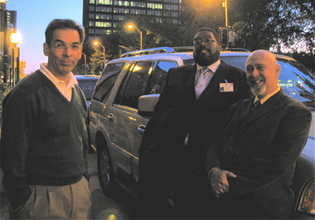 Aldermen showed up to a meeting with the preferred developer of the Coliseum site to make a discovery: They won’t have any further say in what happens.
Aldermen showed up to a meeting with the preferred developer of the Coliseum site to make a discovery: They won’t have any further say in what happens.
Even though City Hall is in the early stages of crafting a proposal with Northland Investment to build a new complex on the grave of the Veterans Memorial Coliseum, it turns out the Board of Aldermen has already forfeited its right to vote on the details, including the land sale and the development agreement.
Four aldermen showed up to City Hall Tuesday afternoon for a briefing with members of Northland, the preferred developer that the city chose last week to build a mixed-use development at the gateway to downtown. (Click here for a background story).
After a confusing interrogative flurry, aldermen found out that the project would likely proceed without them. No plans are in store for the project to come before the Board of Aldermen. The unusual process — land sales usually get a final approval by the full board, the city’s legislative branch — dates back to a decision made over three years ago.
The aldermen didn’t remember that they had already pre-approved the project in a deal laid out in 2005.
Over pizza and Mediterranean salad Tuesday, officials gave them a refresher in legislative history.
The city’s top three development officials, economic development chief Kelly Murphy and her deputies, Chrissy Bonanno and Tony Bialecki, sat down with three aldermen and three members of Northland in a City Hall meeting room. The meet-and-greet was designed to get the parties comfortable with each other before setting out on a four-year process of negotiating, designing and building.
Northland proposes to build over a million square feet in new development, including housing, a new home for Long Wharf Theatre, street-level retail, office space and parking on the 4.5‑acre parcel. The parcel sits between Church, George, State, and North Frontage Streets. Their vision includes a 30-story elliptical residential tower, 550 residences of mixed condos and rental, an eight-story office building, and parking for nearly 1,000 cars. Those figures are not set in stone, as the project is still in a conceptual phase.
Northland estimated that there would be two years of negotiation, approvals and design before construction could start. Construction itself would take an additional two years.
The developers have a portfolio of property valued at $2.1 billion. That includes $500 million in Connecticut, most of which is concentrated in downtown Hartford. It includes one project very similar to its New Haven proposal: Hartford 21, a 960,000 square-foot mixed-use complex abutting the Civic Center Mall. The complex has retail, office space and a 36-story residential tower. (Northland also recently purchased New Haven’s Church Street South low-income housing complex.)
After listening to developers, Aldermanic President Carl Goldfield asked about the approval process.
Murphy replied that the Development Agreement and Land Disposition Agreement would need approval from the Development Commission and Redevelopment Agency. The design would need site plan review before the City Plan Commission.
Goldfield tried to rephrase his question.
“When will you come back to us?” he asked.
Murphy replied that aldermen had already set the terms for the development back in 2005, when aldermen amended a Downtown Municipal Development Plan (MDP) to include the Gateway Downtown Development Project. Their vote on Amendment #2 to the MDP handed over the reigns to the Development Commission to sell or lease the land and carry out the the MDP.
(Click here to read their resolution, made on Feb. 22, 2005. Click hereto read Amendment #2 and click here to read the City Plan advisory report, both of which are incorporated into what aldermen voted on. And click here for design guidelines laid out by Herbert Newman & Partners for the whole Gateway/Coliseum project. Click here to read the minutes from the Feb. 22 aldermanic meeting.)
The MDP set the “values” of the project, as Bonanno put it. It laid out requirements for parking and affordable housing. It required that the Long Wharf Theatre have a place in the plans. It mandated that if a hotel is built, its owner “will not interfere with the formation of a union” among its workers.
Those terms have to be incorporated in the development agreement, according to the aldermen’s resolution.
 Northland did not include a hotel in the plans it submitted to the city. The developers aren’t ruling the option out, however, said Peter Standish, Jr. (pictured), a senior vice president at Northland.
Northland did not include a hotel in the plans it submitted to the city. The developers aren’t ruling the option out, however, said Peter Standish, Jr. (pictured), a senior vice president at Northland.
Goldfield steered the conversation back to his question: At what point in the development would the plans seek aldermanic approval? Two of his colleagues, Downtown Alderwoman Bitsie Clark and Westville Alderman Sergio Rodriguez, jumped in to help, rephrasing his words for city officials in effort to get the answer they were looking for.
The final answer was that developers won’t need further approval from aldermen — unless the plan departs from the requirements laid out in the MDP, Murphy explained. Northland likely won’t need to seek a zoning change because the parcel is zoned for a high FAR (floor-area ratio), she added.
Public hearings will be held before the Development Commission and the Redevelopment Agency on the developer’s agreement and the agreement for selling or leasing the land. The city and Northland also agreed to hold a “charrette,” as was done for the Shartenberg project, to consider public input.
Aldermen at the meeting said they weren’t taking issue with the process, just seeking to clarify. Newhallville Alderman Charles Blango, who came in towards the end of the meeting, asked a few questions about the plans. Then he turned to the alderwoman in the downtown ward.
“You satisfied, Bitsie?”
“I’m very satisfied,” replied Alderwoman Clark. Clark sat on a seven-member panel that selected Northland out of six developers. She called the project “terrific.”
A Look Back
Outside City Hall after the meeting, Goldfield said he’d have to look back at the MDP agreement to see if what city officials were telling them about the process is true. If so, “we would have sold [the Coliseum parcel] without knowing the details” of the sale, he said.
Bialecki, the deputy economic development chief, recalled the project’s history in detail. In 2005, he stood alongside then-economic development director Henry Fernandez in hashing out the MDP amendment with the Board of Aldermen.
“It was a large project,” he recalled Tuesday. “Nobody was going to go forward with this unless things were in place to approve it.” The project included not only the new Long Wharf Theatre but the new Gateway Community College, which is relocating downtown.
“Gateway needed ownership of the [nearby] site before the project could go forward,” he said. The city needed state funds to knock the Coliseum down. And Long Wharf Theatre was lined up for a $750,000 grant to conduct preliminary studies for the new theater. “They couldn’t get that money until they had aldermanic approval,” Bialecki recalled.
After a heated back-and-forth between Fernandez and the board’s then-president, Hill Alderman Jorge Perez, the deal was hatched. Aldermen agreed to lay down a set of principals the developers must adhere to.
The agreement kicked off a years-long process to get Gateway in the ground. The project is near fruition, Bialecki was pleased to report: Design is 80 percent done. The city aims to transfer the property in December. Construction should start next summer, he said.
Bialecki recalled Perez’s caution in hatching the MDP agreement. Before the vote, Perez warned his colleagues “This is the final vote,” Bialecki recalled.
Fernandez was up front about what aldermen were giving up, noted Perez, reached Tuesday evening. (He had missed Tuesday’s briefing due to work obligations.)
“The administration was open and honest about it,” Perez said. “There was a discussion.”
He recalled warning his fellow legislators against “bargaining away” their rights. “You guys realize that we’re giving up the ability to approve anything,” he recalled telling them.
“I thought it was the wrong thing to do,” Perez said.
Perez said the effects of the unusual approval process remain to be seen.
“If they sell the land for a dollar like they did in the Becker deal, then we lose a lot,” said the alderman. “It depends what we give up or don’t give up. If the Becker deal is any indication of how hard we’re going to bargain, I think we made the wrong decision.”
He said the public may lose its ability to influence the process, because the public hearings will be held before mayoral appointees of development panels, instead of before elected officials on the board, who are held more accountable to the public.
“That’s one of the things we lose,” Perez said. “Do we lose more than that? It depends on what the final deal is.”













Shocking. Votes without knowledge of how legislation will affect things.
When is the public's opportunity?